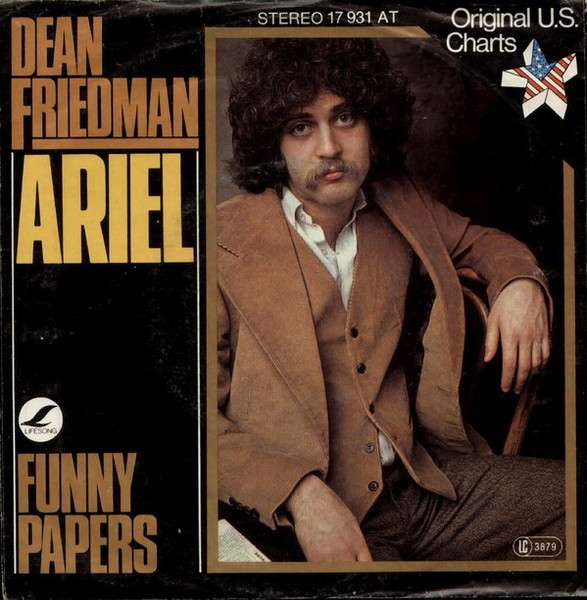Dean Friedman’s “Ariel” might not be the first song that pops into your head when you think of 1970s hits, but for those in the know, particularly around Chicago, it’s an unforgettable tune. This catchy and quirky track, released in 1977, holds a special place in the annals of music history, proving that sometimes the most memorable songs are the ones that carve their own unique path. While it only reached #26 on the national Billboard charts, “Ariel” soared to #4 in Chicago, a testament to its unexpected resonance with local listeners. Let’s delve into what makes this “Ariel Song” so enduringly appealing.
 Dean Friedman Ariel Song 1977 Album Cover
Dean Friedman Ariel Song 1977 Album Cover
The Undeniable Catchiness of “Ariel”
One of the immediate draws of “Ariel” is its sheer catchiness. The melody is instantly memorable, possessing a “fauxldie” quality that evokes a sense of nostalgia, even for those who weren’t around in the 70s. This sound cleverly tapped into the same vein of retro appreciation that fueled the popularity of TV shows like Happy Days and Laverne and Shirley during the same era. The song feels both fresh and familiar, a combination that undoubtedly contributed to its widespread appeal on the radio and beyond.
Lyrical Wit and Relatability: The Heart of the “Ariel Song”
Beyond the catchy tune, the lyrics of “Ariel” are where the song truly shines. Friedman’s songwriting is witty, observant, and remarkably relatable. The opening lines, “I said ‘hi,’ she said ‘yeah, I guess I am’,” are a masterclass in understated humor and awkward first encounters. This sets the tone for a narrative that’s both humorous and heartwarming, detailing a less-than-perfect date that nonetheless ends on a high note – literally and figuratively.
The song is filled with charmingly specific details, like the mention of a vegetarian at Dairy Queen, which was a particularly novel concept in the 70s. These details paint a vivid picture and add to the song’s quirky personality. Even references that might seem geographically specific, like Paramus Park, didn’t detract from the song’s wider appeal, proving that the universal themes of awkward romance and youthful exuberance transcended regional boundaries.
The Tale of Two “Ariel” Songs: Single vs. LP Version
Interestingly, there are distinct versions of the “ariel song,” adding another layer to its story. The single edit differs significantly from the full-length LP version. The most notable change is the lyric “She was a Jewish girl,” which is present in the LP version but altered to “Her name was Ariel” in the single edit. This change was reportedly made to avoid potential radio station reluctance to play the song, reflecting the social sensitivities of the time. Another verse, detailing a trip to Dairy Queen, is also absent from the single version.
These edits resulted in two distinct listening experiences. The single version is a more streamlined, abrupt rendition, while the LP version is fuller, with a cold ending and the inclusion of the potentially controversial lyrics. Interestingly, when Rhino Records included “Ariel” on their Have a Nice Day CD series focusing on late 70s hits, they opted for the LP version, signifying a preference for the more complete and original recording.
Why “Ariel” Remains a Beloved “Ariel Song”
Despite being Dean Friedman’s only major hit, “Ariel” has maintained a lasting legacy. Its enduring appeal lies in its perfect blend of infectious melody, clever lyrics, and relatable storytelling. It’s a song that captures a specific moment in time while still feeling timeless. The fact that a song so rooted in New York references could become a hit in Chicago speaks volumes about its universal charm. It’s a reminder that sometimes, the most unexpected songs can become the most cherished.
If you’ve never experienced the joy of the “ariel song,” or if you’re simply looking to revisit a 70s classic, take a listen to both versions of Dean Friedman’s “Ariel.” You can find the single edit here and the full LP version here. Rediscover the magic of this “ariel song” and you’ll understand why it continues to be a beloved gem from the 1970s.

